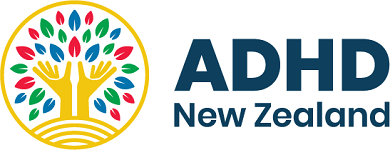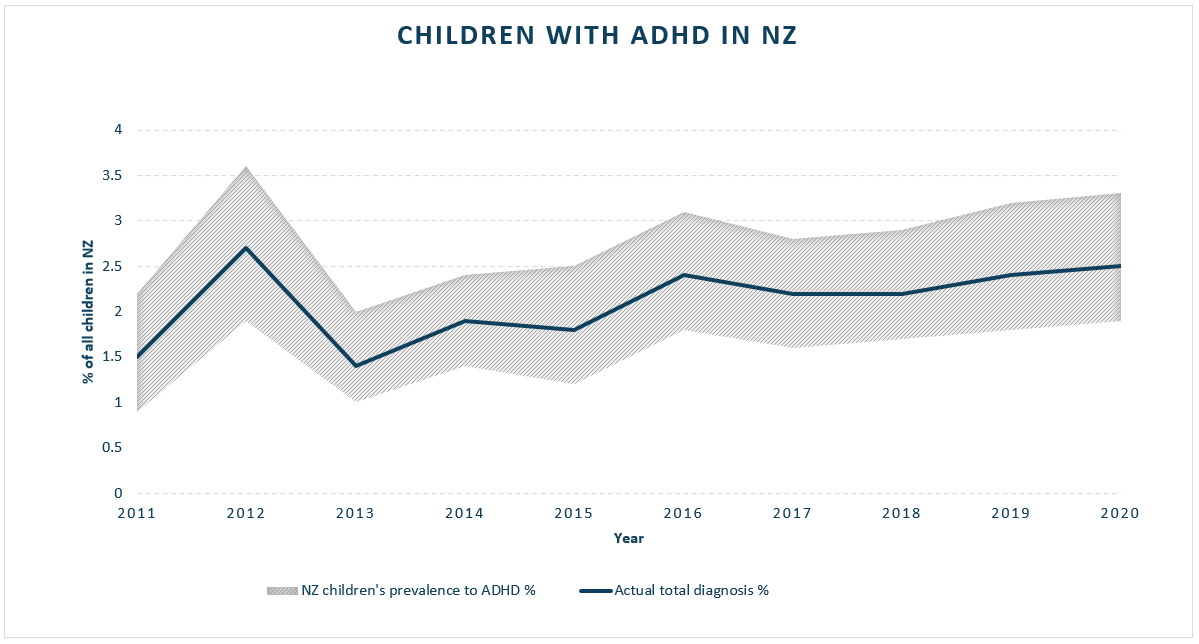Photo by Sasint
What are the signs of ADHD in children and teenagers?
Because ADHD is neurodevelopmental (i.e. dependent on brain development) it's not possible to make an accurate assessment until the age of five or six years. This is when the type of behaviours, often seen in those with ADHD, would be considered grossly immature for their age and a significant departure from typical neurodevelopment.
Data from the Ministry of Health suggests 2.4% of those 18 years and younger have had an ADHD diagnosis.
Data from the Ministry of Health suggests 2.4% of those 18 years and younger have had an ADHD diagnosis.
If your child has ADHD this means they have to work much harder to control and filter attention, behaviours, emotions that come naturally to others of the same age. This is the nature of the "disordered" part. It commonly results in significant fatigue and an even more profound loss of control by the end of the school day
Common ADHD symptoms in kids' early development and childhood
Each person is likely to vary in the type, number, frequency and severity of their ADHD behaviour/symptoms but there are some definite commonalities.
Click on each heading or "+" to find out more.
Click on each heading or "+" to find out more.
POSSIBLE Early signs
- on the go
- cries easily
- poor sleeper
- reflux is more likely
- difficulty maintaining friends
- takes longer to/difficult to settle
- climbs and runs rather than walks, or
- can push in, shove, snatch, blurt out things without noticing others.
InattentiVE BEHAVIOUR
- easily distracted
- forgetting instructions
- extreme difficulty focusing when bored
- trouble staying on task, don't finish tasks
- frustrated by tasks requiring sustained focus
- difficulty moving focus on fun activity to a routine task, or
- can't switch focus between multiple tasks or topics without getting lost.
Hyperactive behaviour
- fidgets and wriggles
- has a “driven” quality, runs and jumps
- talking excessively (often more in girls)
- excessive restlessness, in constant motion
- has difficulty in sitting still or staying seated
- restless sleeper and/or has difficulty settling into sleep
- shows a lot of purposeless activity (i.e., not for a particular reason), or
- insatiable (constantly seeking stimulation and entertainment, sometimes negative).
Impulsive behaviour
- interrupting
- unpredictable behaviour
- intruding in others' personal space
- shouting or blurting out answers or secrets
- acting without thinking of what might happen
- pushing in or walking over others and not noticing, or
- immediate regret and guilt that did or said something but frequently "didn't mean it"
Emotional Impulsivity/dysregulation
- impatient
- low self-esteem
- highly emotional
- easily upset by others
- difficulty controlling temper
- easily frustrated and tantrums
- can overreact to pain and sounds, or
- trouble in friendships and relationships.
executive dysfunction
- often loses things
- forget things needed
- generally disorganised
- poor concept of time and often late
- little to no planning or thinking ahead, or
- little to no automatic reflection (thinking) about actions or consequences.
MORE LIKELY TO HAVE OTHER CHALLENGES
- messy handwriting
- allergies, ezcema and asthma
- specific learning disabilities in reading, writing or math
- Autism Spectrum Disorder (ASD), Anxiety, Anger, Oppositional Defiant Disorder (ODD), or
- Dyspraxia or Developmental Coordination Disorder (DCD) - Clumsy, poor balance, movement coordination, core muscle control, poor ball skills, mixed left-right dominance.
COMMON ASSOCIATED Physical TROUBLES
- digestive upset
- allergies, eczema, asthma
- poor temperature sense and control
- headaches, muscle or stomach pains
- food and drink cravings i.e. sugar or milk
- ear troubles: including grommet insertions, infections and glue ear, or
- eye troubles: including visual tracking, dark circles, puffiness and including allergic rhinitis.
Common Behaviours and Symptoms of ADHD in Adolescence
Each person is likely to vary in the type, number, frequency and severity of their ADHD behaviour/symptoms but there are some definite commonalities.
Click on each heading or "+" to find out more.
Click on each heading or "+" to find out more.
Behaviour
- poorly organised
- disorganised and untidy
- forgetful, loses things
- feelings of being overwhelmed
- often late (poor time management)
- day-dreamy and distracted in their head
- slow to process information and directions
- difficulty in getting things done "properly"
- easily distracted and finds it hard to focus
- emotionally immature but intuitive, empathetic and kind
- difficulty concentrating and focusing, finds it hard to complete tasks, or
- impulsive behaviour, takes unnecessary risks for the fun of it, can’t see the consequences of actions.
School
- finds studying extremely boring, frustrating and procrastinates, or
- has trouble keeping up with demands of homework and poor motivation (unless they love the subject).
Moving
- if experienced hyperactivity, this has settled but are still fidgety, jittery or restless, or
- driving erratically, has lots of minor accidents, some afraid to drive at all.
socialising
- interrupts others
- talking excessively without necessarily noticing if others are bored or not interested
- getting upset quickly, over-reacting and not calming self quickly so appearing emotionally volatile
- attracted to exciting people/relationships that can be unhealthy or destructive (without meaning too)
- eats/drinks or does recreational drugs to calm themselves down or to excite them with little to no thought about the consequences
- being a highly empathetic "emotional sponge" and so can be attracted to helping others but also very affected by their emotional states, or
- has significant friendship issues - often due to missing/not paying attention to the social cues of others (resulting in offending or upsetting them thoughtlessly, rather than on purpose).





